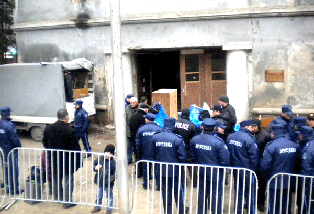Sopo Getsadze
Situation analysis of IDP families was the main topic of the February 4 meeting organized by the IDP NGO “Sinergia”. The members of the NGOs from various regions of Georgia spoke about the social-economic conditions of IDP families in their regions.
Samegrelo
IDPs living in the Samegrelo region oppose each other. The reason is due to the government’s relatively unbalanced attention given to the so-called new IDPs who resettled in Samegrelo from Tbilisi. Despite this fact, the new IDPs have a hard life in the region; particularly in Potskhoetseri village. This is because they are less adapted to the environment and unlike old IDPs, they do not have plots there, nor do they have cattle. However, IDPs of both categories have a single common problem – expensive products in the village. For example, they pay 1 GEL for a loaf of bread in Potskhoetseri while it costs 0, 65 – 0, 80 GEL in other places.
Every IDP family in Potskhoetseri received their fire-wood late. Monitoring reports have also found that the village has food problems and the locals are in need of assistance.
As for the infrastructure, the village is not supplied with electricity. After the new IDPs were settled, every family was supplied with electricity, and three more residential buildings are planned to be rehabilitated for the new IDPs. There is no kindergarten and outpatient clinic in the village; there is only a secondary school in Potskhoetseri.
240 families (530 people) live in Potskhoetseri. 19 families were resettled there from Tbilisi in August of 2010.
Imereti
In the Imereti region 1, 856 IDP families have accommodation. 240 IDP families registered their accommodations. 20 more families are awaiting property registration.
The situation is difficult in three buildings in Kutaisi; the government said they cannot be rehabilitated though the IDPs do not want to leave their accommodations. One of the buildings is Kutaisi Public School # 12. The IDPs do not want to leave the building because they do not want to move to the suburbs from the city center. The second building is Hotel Tbilisi from where 38 families were moved to new accommodations. One group of IDP families who stayed in the building want a cottage and another group want to stay there.
10 residential buildings are being built in the Tskaltubo district for IDPs residing in the district. The Minister of IDPs from the Occupied Territories, Accommodation and Refugees of Georgia Koba Subeliani said that 21 collective centers will be constructed in the district. However, officials of the local district administration said that they have funds for omly 10 buildings so far and five of them were already constructed.
IDPs cannot be completely settled in the new buildings. It is also unknown how 350 IDP families will be selected for the new buildings. The local officials said 700 IDPs want to live in Poti. However, the NGOs interviewed IDPs and none of them plan to move to Poti.
6, 391 IDPs live in 22 collective centers in Tskaltubo.
IDP Irma Gelantia from Abkhazia, member of the Initiative Group of IDP Mothers, spoke about the eviction details which took place in January in Tbilisi. “On December 13 we received undated, unsealed warning letters; in January the police came and evicted us. We requested time till May but they refused. As a result, our children became victims; they cannot go to kindergartens and schools.”
The Gelantias, who were evicted from Zubalashvili Street in Tbilisi, did not receive compensation nor was alternative accommodation offered. They were told that they should receive accommodation in Tbilisi so they should wait for it. Before that, the family was offered to rent flat and now the Gelantias have to pay rent themselves.
The meeting participants also discussed whether IDPs legally lived in the buildings of state institutions. The representative of the Georgian Young Lawyers Association said that if the state paid their electricity bills, sent election notifications to them and held PR-campaigns in those buildings, that means the IDPs live in those buildings legally.
News
December 13, 2023
Ethnic minorities outside the peace dialogue
November 6, 2023
‘Peace’ agenda of political parties
Popular
Articles
February 13, 2024




